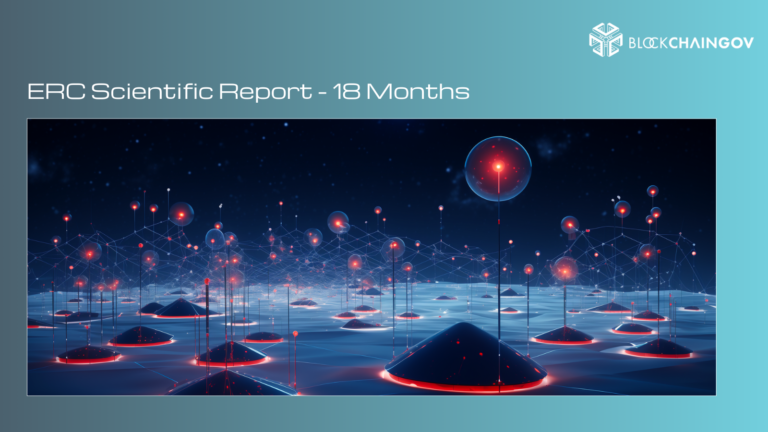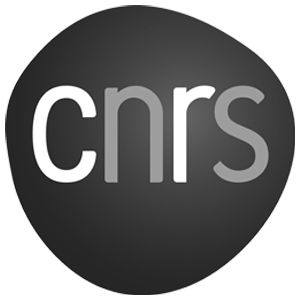18 Months of ERC Grant - Bits from the Scientific Report

In 2023, BlokchainGov completed the first half of the three-year-long ERC grant. We were requested to report the achievements and goals of our project so far. We took the chance to reflect and look back at 1.5 years of experimentation and research in the space. This exercise was useful to summarize and recap the progress we made and the challenges we encountered in this time. We desire to share some bits from the Scientific Report to mark this moment in time.
Advancements in Blockchain Governance Research
What kind of progresses we made in our research? How did our findings influenced the premises and the methodologies of our research?
- Unveiling Trust in Blockchain Systems:
Beyond conventional trustless technology perceptions, our research exposes the persistence of trust in blockchain systems. This profound insight challenges existing notions and explores how trust can be leveraged to enhance governance structures. - Understanding Challenges in Distributed Governance:
Challenging assumptions in early distributed governance literature, our research delves into the challenges faced by collaborative organizations. Apathy, technical constraints, and uneven participation emerge as critical issues that require proactive addressing for effective governance. - Tacit Governance Practices Revealed:
Incorporating innovative ethnographic methods, including the telescope bot, our research uncovers the tacit and invisible governance practices underpinning many blockchain systems. This in-depth understanding enhances our knowledge of the intricacies involved in governing blockchain networks. - Token-Bound NFT License:
Addressing critical issues in the NFT space, our research introduces the Token-Bound NFT License. This novel copyright license empowers NFT owners with comprehensive rights over associated creative works, tackling the separation of NFTs from the underlying content. - Pioneering New Network Sovereignties:
Our project challenges traditional paradigms of Network States by proposing New Network Sovereignties. Based on commons-based principles, these non-state actors represent a new model for post-Westphalian global governance, sparking a reevaluation of international relations. - Alegality Paradigms :
Alegal paradigms, a key focus of our research, redefine governance in the context of blockchain systems by navigating the space beyond conventional legality. In this innovative approach, actions within decentralized networks, such as smart contracts and DAOs, exist in regulatory gray areas, neither explicitly legal nor illegal. Alegal governance recognizes the unique features of blockchain, prompting a reassessment of regulatory frameworks. It advocates for a balanced approach that preserves the trust mechanisms inherent in decentralized systems while acknowledging the need for regulatory adaptation. This concept challenges traditional legal norms, paving the way for a governance paradigm that embraces the distinctive characteristics of blockchain technologies on a global scale. - Off Chain Constituzionalization:
Recognizing the importance of off-chain constitutions for blockchain governance, we aim to challenge the prevailing focus on designing trustless systems and solve governance issues.

Societal Impacts and Global Outreach
BlockhainGov’s work aims to impact the current blockchain landscape and to shape the evolution of both the technology and the culture surrounding it. Here are some of the ways in which we try to propagate our research in the space.
- Timely and Impactful Regulation. The case of DAO Model Law:
Our work on the DAO Model Law significantly contributes to global discussions on DAO regulation. Striking a balance between public policy concerns and the unique features of blockchain systems, our approach influences legislative developments and broader public engagement with DAOs. - Token-Bound NFT License and Regulatory Innovation:
The aforementioned Token-Bound NFT License introduces a novel legal framework addressing copyright and ownership concerns in the NFT space. This innovation has the potential to reshape how NFT artists license their works and navigate legal considerations. - Public Awareness Initiatives:
Our team actively engages in initiatives to raise public awareness about blockchain governance and New Network Sovereignties. Through op-eds, blogs, and a podcast series (Overthrowing the Network State), we provide a nuanced perspective accessible to a broad audience. - Co-Design for Improved Governance:
Our research outcomes extend beyond academia, offering practical solutions and recommendations for industry practitioners. By collaborating and receiving feedback from industry stakeholders, we ensure that our work contributes to improving governance practices in the broader community.










 This site is licensed under a Creative Commons Attribution 4.0 International License. The BlockchainGov project has been funded by an European Research Council Grant.
This site is licensed under a Creative Commons Attribution 4.0 International License. The BlockchainGov project has been funded by an European Research Council Grant.